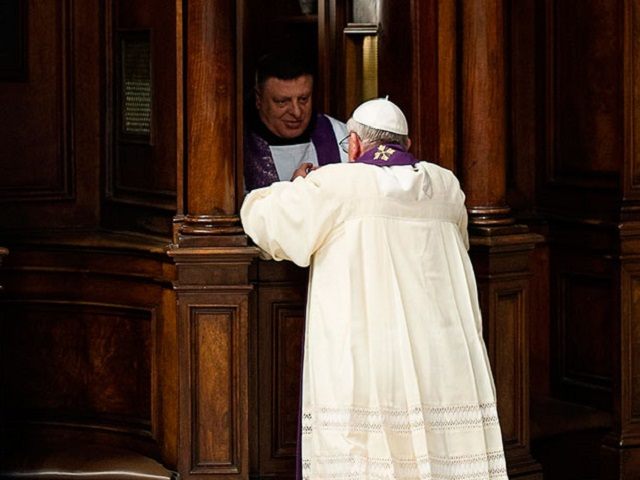This has been a big week for Pope Francis, as he celebrated his second anniversary as Pope, granted a lengthy interview in which he said time is ticking away on his pontificate, and called for an extraordinary Jubilee year of mercy for 2016. In the midst of this flurry of activity, Francis also found time to address a group of priests about how to be good confessors, before going to confession himself.
It’s not often that ordinary folk are privy to what goes on at the other side of the confessional screen. On Thursday, Pope Francis offered some advice that shed light on what priests face when hearing other people’s sins.
As a good Jesuit, the Pope structured his advice along three points.
His first piece of advice to priests was to help penitents experience God’s mercy.
“Confession should not be a ‘torture,’” the Pope said, “but everyone should leave the confessional with joy in his heart, his face beaming with hope,” even if sometimes “wet with tears of conversion and the joy that comes from it.”
Francis told the priests that confession should not “become a heavy, annoying, and intrusive interrogation.” It should be a liberating encounter, the Pope said, which also includes the commitment to make reparation, as far as possible, for the evil committed.
The Pope also tried to clear up confusion between mercy and laxity, insisting that they are not the same thing. “Neither an overly indulgent confessor nor a severe confessor is merciful,” Francis said. The first says, “Go on. This is not a sin; don’t worry!” The other simply insists on the rules or laws that have been broken. “Neither of these,” said Francis, “is a brother to the penitent, taking him by the hand and accompanying him on his path of conversion!”
A good confessor, Francis said, is like the Good Shepherd “who goes to search for the lost sheep and carries it upon his shoulders.”
The only one who can do this, the Pope continued, is the priest “who prays, the confessor who cries, the confessor who knows that he is a bigger sinner than the penitent, and if he didn’t commit the sins that the penitent did, it is simply by the grace of God.”
Second, the Pope told the priests to let themselves be educated by the Sacrament of Penance because both the priest and the penitent should benefit from the experience. “How many times it happens,” he said, “that the confessions we hear edify us!” The Pope spoke of the experience of meeting Christians who open themselves up before God with humble and contrite hearts: “simple souls, the souls of the poor in spirit, who abandon themselves totally to the Lord, who trust the Church and, therefore, also the confessor,” he said.
This is an opportunity for the confessor himself to grow, Francis said. Confessors even have the grace of often “witnessing miracles of conversion. People who for months, sometimes for years are under the power of sin and then, like the prodigal son, come to their senses and decide to get up and return to the house of the Father to beg his forgiveness.”
Finally, the Pope also told the priests to keep a “supernatural outlook” on the ministry they carry out as confessors, keeping their eyes “on heaven.”
Never forget, he told them, “that no one is placed in such a ministry because of his own merit, for his theological or legal skills, or for his human or psychological qualities. We all have been made ministers of reconciliation by the pure grace of God, freely and out of love.”
He told the priests to let themselves be shamed by the goodness of the penitents whose sins they hear. “When I hear this sin,” he said, “and this soul who repents with much sorrow and so much delicacy of spirit, am I able to be ashamed of my own sins?”
“We are ministers of mercy through the mercy of God,” he said. “We must never lose this supernatural outlook, which makes us very humble, welcoming and merciful to every brother and sister who asks us to hear their confession.”
“And if I didn’t fall into that ugly sin, and I am not in prison, it is only by the pure grace of God, and not my own merit!” Francis said.
Follow Thomas D. Williams on Twitter @tdwilliamsrome.

COMMENTS
Please let us know if you're having issues with commenting.